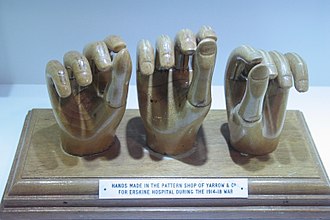
Erskine is a town in the council area of Renfrewshire, and historic county of the same name, situated in the West Central Lowlands of Scotland. It lies on the southern bank of the River Clyde, providing the lowest crossing to the north bank of the river at the Erskine Bridge, connecting the town to Old Kilpatrick in West Dunbartonshire. Erskine is a commuter town at the western extent of the Greater Glasgow conurbation, bordering Bishopton to the west and Renfrew, Inchinnan, Paisley and Glasgow Airport to the south. Originally a small village settlement, the town has expanded since the 1960s as the site of development as an overspill town, boosting the population to over 15,000. In 2014, it was rated one of the most attractive postcode areas to live in Scotland.

Bishopton (/bɪʃəptən/) is a village in Renfrewshire, Scotland. It is located around 2 miles (3 km) west of Erskine. Royal Ordnance Factory Bishopton was located on the edge of the village and is now being redeveloped as private housing into a community named Dargavel.

Sir William Macewen was a Scottish surgeon. He was a pioneer in modern brain surgery, considered the father of neurosurgery and contributed to the development of bone graft surgery, the surgical treatment of hernia and of pneumonectomy.

Maggie's centres are a network of drop-in centres across the United Kingdom and abroad that aim to help anyone who has been affected by cancer.
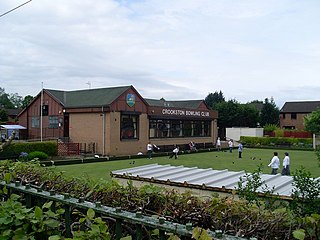
Crookston is a residential suburb on the southwestern edge of the city of Glasgow, Scotland.
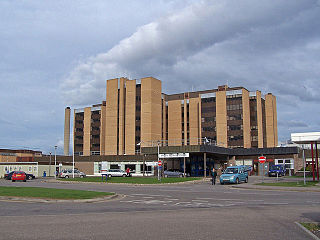
Raigmore Hospital is a health facility located in Inverness, Scotland. It serves patients from the local area as well as providing specialist services to patients from across the Highland area. It is a teaching hospital, educating a range of healthcare professionals in association with the Universities of Aberdeen and Stirling. It is managed by NHS Highland.

Sunnybrook Health Sciences Centre (SHSC), commonly known as Sunnybrook Hospital or simply Sunnybrook, is an academic health science centre located in Toronto, Ontario, Canada. The hospital is the largest trauma centre in Canada. It is accredited as a Level I trauma centre by the Trauma Association of Canada and the American College of Surgeons, the first hospital outside of the United States to achieve ACS accreditation. Sunnybrook is a teaching hospital fully affiliated with the University of Toronto. The hospital is home to Canada's largest veterans centre, in the Kilgour Wing and the George Hees, which cares for World War II and Korean War veterans.
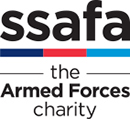
SSAFA, the Armed Forces charity, the Soldiers', Sailors', and Airmen's Families Association, is a UK charity that provides trusted support to serving men and women and veterans from the British Armed Forces and their families or dependents. Anyone who is currently serving or has ever served in the Royal Navy, British Army or Royal Air Force and their families, both regulars and reserves, is eligible for their help.
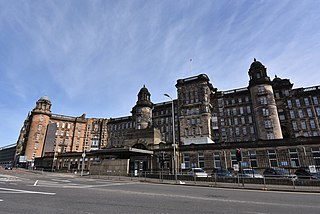
The Glasgow Royal Infirmary (GRI) is a large teaching hospital. With a capacity of around 1,000 beds, the hospital campus covers an area of around 8 hectares, and straddles the Townhead and Dennistoun districts on the north-eastern fringe of the city centre of Glasgow, Scotland. It is managed by NHS Greater Glasgow and Clyde. It was originally opened in 1794, with the present main building dating from 1914, with a major extension completed in 1982.
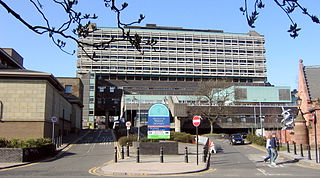
The Western Infirmary was a teaching hospital situated in Yorkhill in the West End of Glasgow, Scotland, that was managed by NHS Greater Glasgow and Clyde. It was opened in 1874 and closed in 2015.

Blind Veterans UK, formerly St Dunstan's, is a large British charity, providing free support and services to vision-impaired ex-servicemen and women and National Service personnel. Blind Veterans UK is a registered charity in England and Scotland and operates throughout the United Kingdom. It has its head office in London and centres in Llandudno and Rustington.

Stobhill Hospital is located in Springburn in the north of Glasgow, Scotland. It serves the population of North Glasgow and part of East Dunbartonshire. It is managed by NHS Greater Glasgow and Clyde.
Blesma, The Limbless Veterans is a British charity that helps all serving and ex-Service men and women who have lost limbs, or lost the use of limbs or eyes, to rebuild their lives by providing rehabilitation activities and welfare support. It operates throughout the United Kingdom and is a registered charity.

The Golden Jubilee University National Hospital is a hospital in Clydebank, near Glasgow, Scotland. It was opened in 1994 and is managed by a Special Health Board appointed by NHS Scotland.

Children’s Hospices Across Scotland (CHAS) is a registered charity that provides the country's only hospice services for children and young people with life-shortening conditions, and services across children’s homes and hospitals. The first hospice was built thanks to the late editor-in chief of the Daily Record and Sunday Mail, Endell Laird, who launched a reader appeal which raised £4million. CHAS offers children’s hospice services, free of charge, to every child, young person and their families who needs and wants them.

Mar Hall is a 5-star hotel and golf resort in Bishopton, Renfrewshire. It is situated in Erskine House, a category A listed building. Formerly the building was the Erskine Hospital.

Erskine Ferry sailed across the River Clyde from Erskine to Old Kilpatrick. The ferry was also referred to as East Ferry of Erskine as there was another ferry to Dumbarton a few miles down river, known as West Ferry. It is reputed to be the oldest ferry crossing of the Clyde. The crossing was part of the A740 route from Paisley to Old Kilpatrick. It was established in 1777 and replaced by the Erskine Bridge in 1971.
Royal British Legion Industries is a charity based in the UK that helps Armed Forces veterans, disabled people and people who are unemployed. It runs a social enterprise, Britain's Bravest Manufacturing Company, a UK-wide employment support programme for Armed Forces veterans, Lifeworks, a variety of housing for veterans and their families, as well as running back-to-work support for people who have been long-term unemployed or have a disability/health condition. RBLI's headquarters are in Aylesford, Kent, however they support the Armed Forces community nationwide. RBLI is a separate charity from The Royal British Legion.

Glen Art is a Scottish charity helping those from a military background return to civilian life. Their projects and artistic events aim to bring people together and strengthen relationships between ex-service personnel and their communities. Their facility at Erskine provides both dogs and training for veterans and their families.

Leverndale Hospital is a mental health facility at Crookston, Glasgow, Scotland. It is managed by NHS Greater Glasgow and Clyde. The Towerview Unit, which has been taken out of use, is Category A listed.


